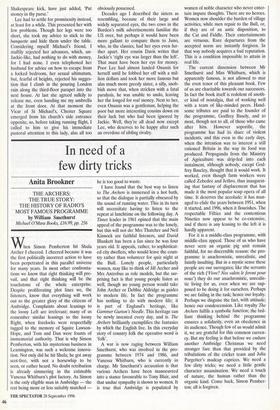In need of a few dirty tricks
Anita Brookner
THE ARCHERS: THE TRUE STORY: THE HISTORY OF RADIO'S MOST FAMOUS PROGRAMME by William Smethurst Michael O'Mara Books, £16.99, pp. 256
When Simon Pemberton hit Shula Archer I cheered. I cheered because it was the first politically incorrect action to have been perpetrated in this parallel universe for many years. In most other confronta- tions we know that right thinking will pre- vail, and that right thinking will be the touchstone of the whole enterprise. Despite proliferating plot lines we, the listeners, know that everything will work out to the greater glory of the citizens of Ambridge. Complaints about leanings to the loony Left are irrelevant; many of us remember similar leanings to the loony Right, when forelocks were respectfully tugged to the memory of Squire Lawson- Hope, and Tom and Dan were founts of immemorial authority. That is why Simon Pemberton, with his mysterious business in Leamington, was such a welcome innova- tion. Not only did he hit Shula; he got away scot-free, with not a horsewhip to be seen, or rather heard. No doubt retribution is already simmering in the estimable Vanessa Whitburn's plot factory. As Simon is the only eligible man in Ambridge — the rest being more or less suitably matched - THE SPECTATOR 28 September 1996
he is too good to waste.
I have found that the best way to listen to The Archers is immersed in a hot bath, so that the dialogue is partially obscured by the sound of running water. This in its turn will necessitate having to listen to the repeat at lunchtime on the following day. A Times leader in 1961 opined that the main appeal of the programme was to the lonely, but this will not do: Mrs Thatcher and Neil Kinnock are faithful listeners, and David Blunkett has been a fan since he was four years old. It appeals, rather, to sophisticat- ed city dwellers, who would leave the coun- try rather than volunteer for quiz night at the Bull. Lonely people, particularly women, may like to think of Jill Archer and Mrs Antrobus as role models, but the sur- prising fact is that young people listen as well, though no young person would take John Archer or Debbie Aldridge as guides to modern life. In fact the programme has nothing to do with modern life; it is part of England's heritage, like Gammer Gurton's Needle. This heritage can be newly invented every day, and is. The Archers brilliantly exemplifies the fantasies by which the English live. In this everyday story of country folk the operative word is 'folk'.
A war is now raging between William Smethurst, who was involved in the pro- gramme between 1974 and 1986, and Vanessa Whitburn, who is currently in charge. Mr Smethurst's accusation is that various Archers have been manoeuvred into a stance favourable to Tony Blair, and that undue sympathy is shown to women. It is true that Ambridge is populated by women of noble character who never enter- tain impure thoughts. There are no heroes. Women now shoulder the burden of village activities, while men repair to the Bull, or, if they are of an antic disposition, to the Cat and Fiddle. Their entertainments are virtuous. Rare departures from the accepted norm are instantly forgiven. In that way nobody acquires a bad reputation. This is a condition impossible to attain in real life.
The current dissension between Mr Smethurst and Miss Whitburn, which is apparently famous, is not allowed to mar the even tenor of this pleasant book. Few of us are charitable towards our successors. In fact the book itself is redolent of anoth- er kind of nostalgia, that of working well with a team of like-minded peers. Hand- some tributes are paid to the founder of the programme, Godfrey Basely, and to most, though not to all, of those who came after him. However soporific, the programme has had its share of violent incidents, and this even in the early days, when the intention was to interest a still rationed Britain in the way its food was produced. Propaganda from the Ministry of Agriculture was drip-fed into each instalment, although nobody, except God- frey Baseley, thought that it would work. It worked, even though farm workers were called Zebedee and Jethro, thus inaugurat- ing that fantasy of displacement that has made it the most popular soap opera of all time. It deserves the accolade: it has man- aged to elide the years between 1951, when it started, and 1996, when it flourishes. The respectable Fifties and the contentious Nineties now appear to be co-extensive, and if there is any leaning to the left it is hardly apparent.
For it is a middle-class programme, with middle-class appeal. Those of us who have never seen an organic pig unit remain faithful, for no discernible reason: the pro- gramme is anachronistic, unrealistic, and faintly insulting. But in a mystic sense these people are our surrogates; like the servants of the rich (`Vivre? Nos valets le feront pour nous') they do our anachronistic, unrealis- tic living for us, even when we are sup- posed to be doing it for ourselves. Perhaps we are failing in the task; hence our loyalty. Perhaps we disguise the fact, with attitude; hence our condescension. Like royalty The Archers fulfils a symbolic function; the bril- liant thinking behind the programme ensures a solidarity, even an obedience in its audience. Though few of us would admit it, we are grateful for this common curren- cy. But my feeling is that before we endure another Ambridge Christmas we need stronger fare than that provided by the tribulations of the cricket team and Julia Pargetter's madcap caprices. We need a few dirty tricks; we need a little gentle character assassination. We need a touch of nature, the human rather than the organic kind. Come back, Simon Pember- ton; all is forgiven.


















































































 Previous page
Previous page